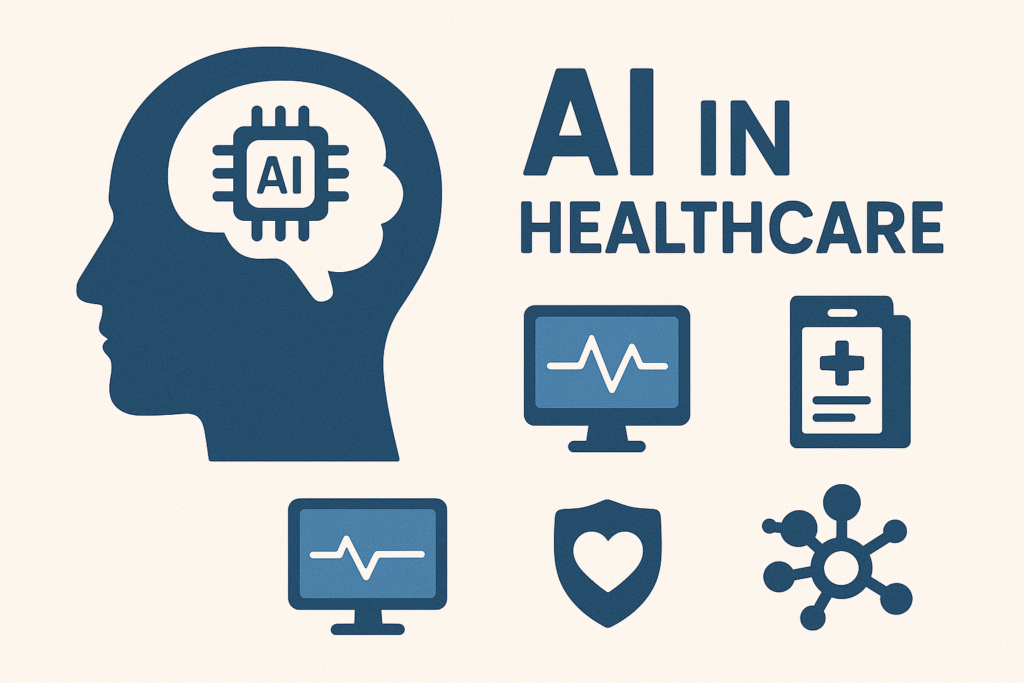Overview:
Artificial Intelligence (AI) is no longer just a futuristic idea—it is an essential technology reshaping the healthcare industry today. From AI-powered personal assistants to groundbreaking diagnostic tools and intelligent health monitoring systems, AI is revolutionizing how care is delivered, accessed, and managed.

This long-form article explores how AI is transforming healthcare through three major pillars: personal health assistants, diagnostic intelligence, and real-time patient monitoring. Whether you’re a tech enthusiast, a healthcare professional, or a curious reader, understanding how AI is improving lives is crucial.
What is AI in Healthcare?
Artificial Intelligence in healthcare refers to the use of machine learning algorithms, natural language processing (NLP), deep learning, and data analytics to perform tasks traditionally requiring human intelligence. These tasks include interpreting medical images, predicting disease outcomes, engaging patients through virtual assistants, and much more.
With the ability to analyze massive datasets quickly and accurately, AI offers powerful solutions to reduce human error, improve clinical outcomes, and lower healthcare costs.
Benefits of AI in Healthcare
Before diving into the specific areas, let’s explore the broader benefits of integrating AI in healthcare:
- Faster and more accurate diagnosis
- Reduced burden on healthcare professionals
- 24/7 patient support through virtual assistants
- Real-time health monitoring and alerts
- Personalized treatment and predictive care
- Lower operational costs for hospitals and clinics
AI Personal Assistants: Your Virtual Health Companion
AI-driven personal health assistants are reshaping the patient experience by offering round-the-clock support. These assistants are capable of scheduling appointments, sending medication reminders, answering health queries, and even helping manage chronic conditions.
How Do They Work?
These assistants rely on Natural Language Processing (NLP) and machine learning to understand user inputs, access health data, and provide intelligent responses or reminders tailored to the individual’s medical history.
Leading AI Health Assistants:
- Ada Health: A symptom checker used by over 10 million users worldwide. It evaluates symptoms based on patient input and suggests possible causes.
- Amazon Alexa Health Skills: Helps users track fitness goals, medications, and even provides first-aid instructions.
- Youper: An emotional health assistant powered by AI, using cognitive behavioral therapy (CBT) techniques to improve mental health.
- Google Fit + Fitbit AI: Tracks fitness and wellness metrics, offering insights based on heart rate, sleep, and activity patterns.
These tools not only enhance patient engagement but also reduce pressure on healthcare systems by handling routine queries and support tasks.
AI in Diagnosis: Accuracy Meets Efficiency
AI is making diagnosis faster, cheaper, and often more accurate. Using algorithms trained on millions of medical images or case studies, AI systems can detect diseases at early stages and reduce human error.
Real-World Use Cases:
- Google DeepMind: Its AI model detects over 50 types of eye diseases with accuracy comparable to leading specialists.
- IBM Watson Health: Analyzes clinical data to assist in cancer diagnosis and treatment recommendations.
- PathAI: AI-powered pathology tool that increases accuracy in cancer detection and supports early-stage diagnosis.
- Lunit INSIGHT: AI software used in radiology to detect lung cancer from chest X-rays.
These tools can process and interpret complex data in seconds, giving doctors valuable decision support. For example, AI can flag a potential tumor in an MRI before a radiologist reviews it, saving critical time.
Disease Areas AI Can Help Diagnose:
- Cancer (breast, lung, skin, etc.)
- Diabetic retinopathy
- Alzheimer’s disease
- Cardiovascular conditions
- Infectious diseases
AI in Health Monitoring: Continuous, Real-Time Care
One of the most impactful areas of AI is in remote health monitoring. With the rise of wearable technology and smart sensors, AI systems can continuously track a patient’s vitals and alert doctors in case of abnormalities.
This is particularly useful for:
- Chronic disease management (e.g., diabetes, hypertension)
- Post-operative care
- Elderly or high-risk patient monitoring
- Early detection of health deterioration
Top AI-Powered Monitoring Devices:
- Apple Watch with ECG and Blood Oxygen Monitoring: Detects heart arrhythmias like AFib.
- Withings ScanWatch: Offers heart rate, ECG, sleep apnea, and oxygen level monitoring.
- Biofourmis: Uses AI analytics to detect changes in patient health for early intervention.
- Current Health: Combines wearable sensors and AI to monitor patients at home after surgery.
These devices use real-time data analysis, enabling doctors to intervene proactively instead of reactively.
Privacy, Ethics & Challenges in AI Healthcare
While the benefits are immense, deploying AI in healthcare comes with ethical and legal considerations. Some of the major concerns include:
- Data privacy and security: Patient data must be protected under regulations like HIPAA and GDPR.
- Bias and fairness: AI trained on non-representative datasets can lead to biased decisions.
- Transparency: Clinicians must understand and trust AI recommendations, requiring explainable AI models.
- Accountability: Determining liability in the case of AI failure remains a legal gray area.
Ensuring ethical AI development, transparent algorithms, and robust regulation is essential as the technology matures.
The Future of AI in Healthcare
Looking ahead, AI is set to revolutionize every aspect of medicine and health:
- AI-augmented robotic surgery: Enhancing precision and reducing human error in the OR.
- Predictive analytics: Forecasting disease outbreaks and hospital readmission risks.
- Genomic AI tools: Personalized medicine based on a patient’s genetic profile.
- AI hospitals: Smart healthcare facilities with automated workflows and digital patient twins.
With further advancements in computing power, edge AI, and 5G connectivity, we are moving closer to a future where AI becomes an essential healthcare co-pilot.